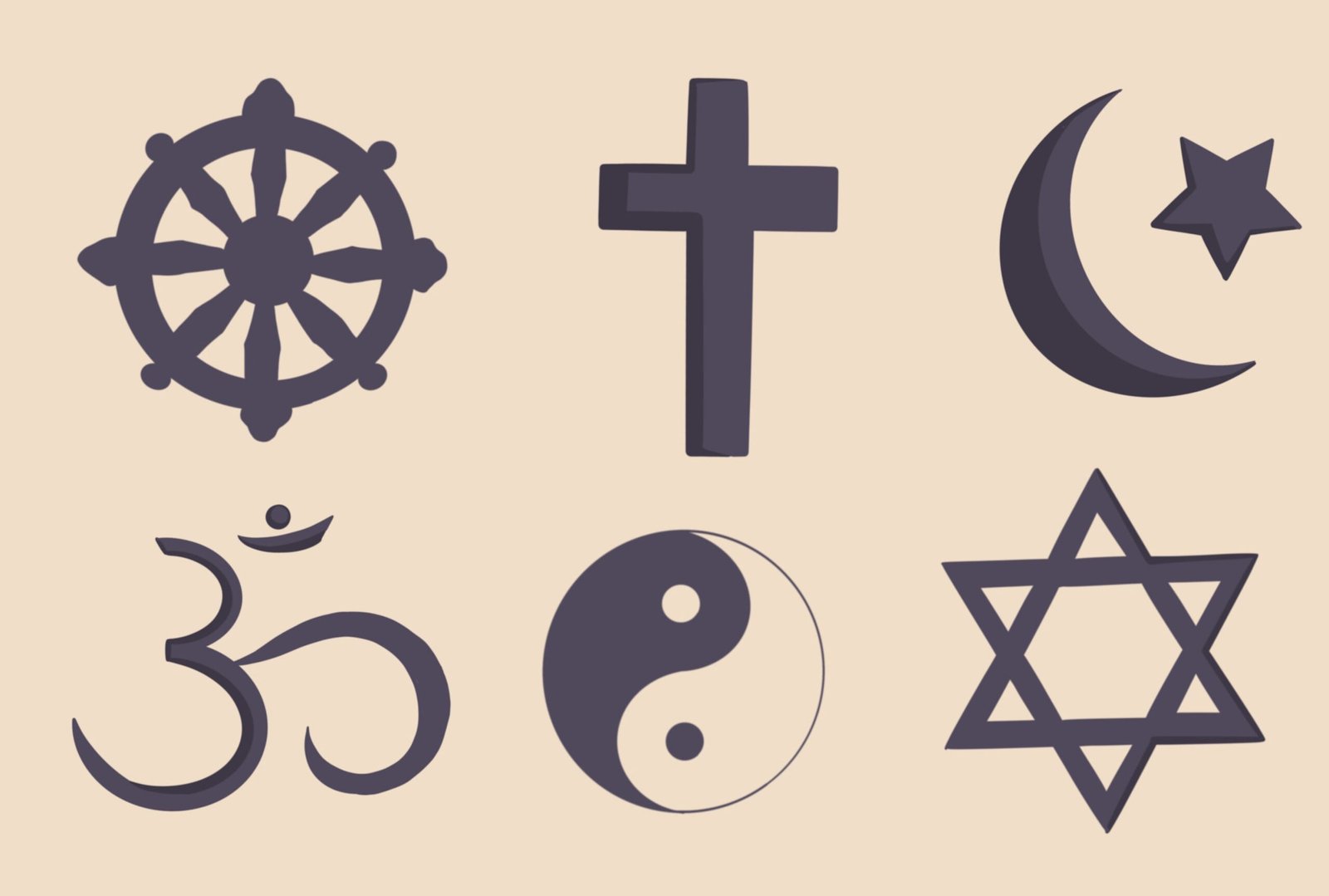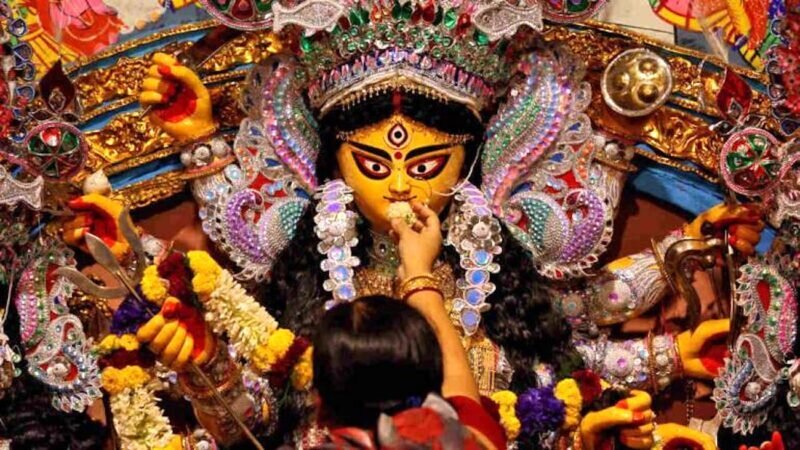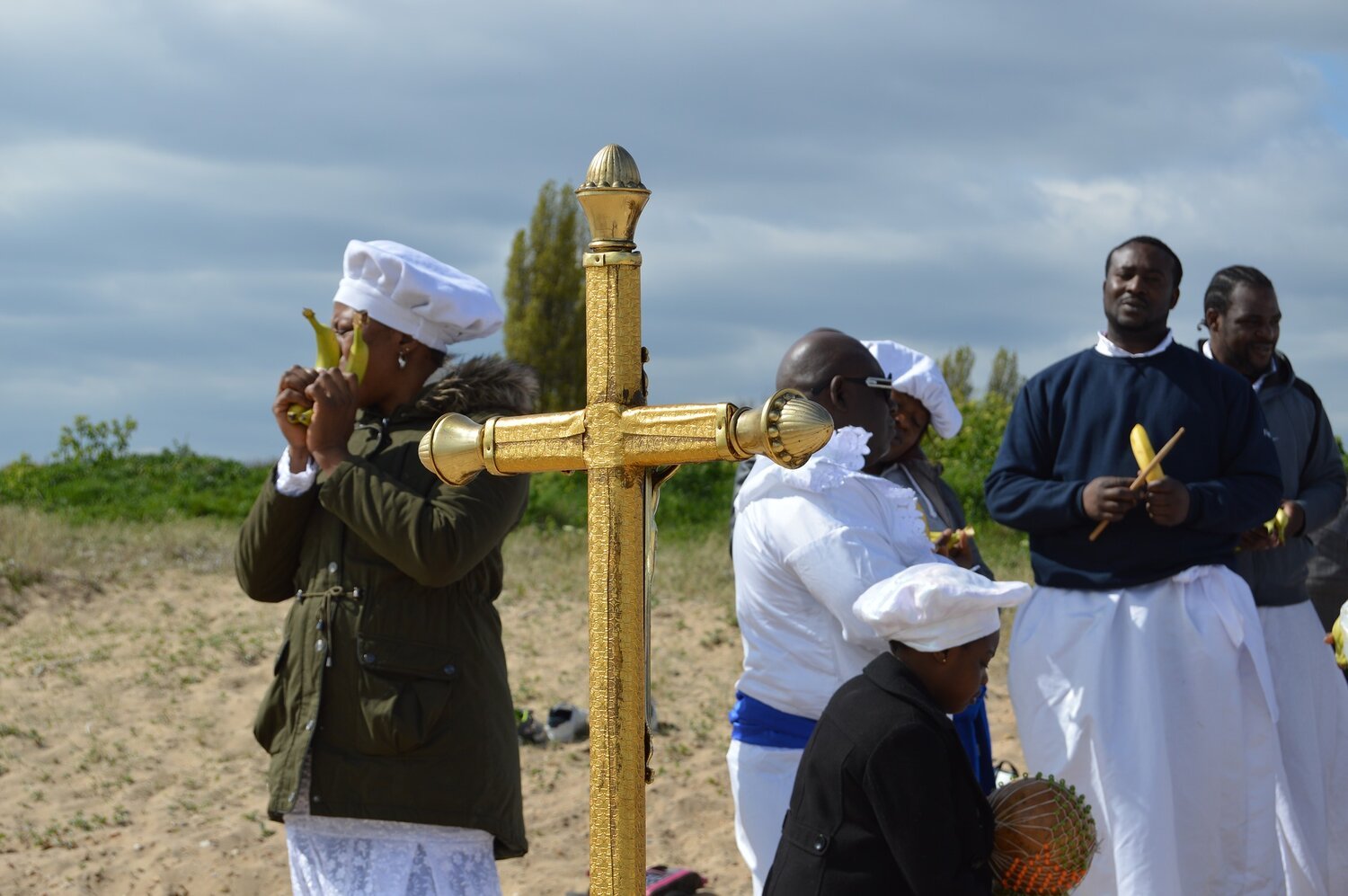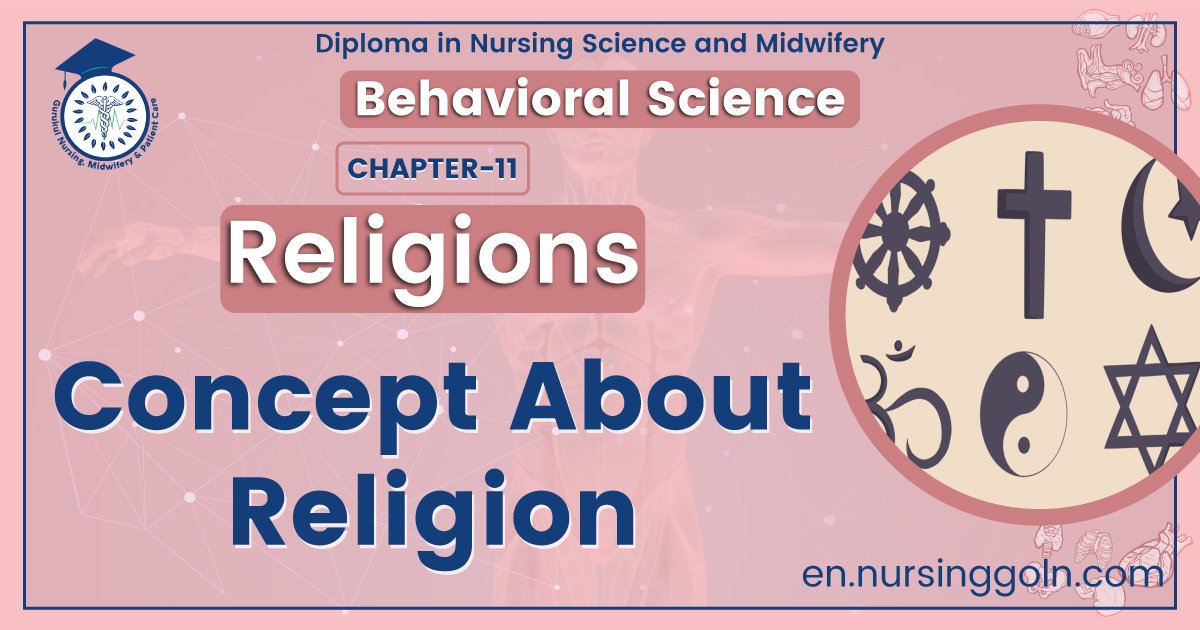Concept About Religion – Behavioral sciences explore the cognitive processes within organisms and the behavioral interactions between organisms in the natural world. It involves the systematic analysis and investigation of human and animal behavior through the study of the past, controlled and naturalistic observation of the present and disciplined scientific experimentation and modeling.
It attempts to accomplish legitimate, objective conclusions through rigorous formulations and observation. Generally, behavior science deals primarily with human action and often seeks to generalize about human behavior as it relates to society.
Concept About Religion
Religion is a word which refers to approaches to human spirituality which usually encompass a set of narratives, symbols, beliefs and practices, often with a supernatural or transcendent quality, which give meaning to the practitioner’s experiences of life through reference to a higher power or truth. It may be expressed through prayer, ritual, meditation, music and art, among other things.
It may focus on specific supernatural, metaphysical, and moral claims about reality (the cosmos and human nature) which may yield a set of religious laws, ethics, and a particular lifestyle. Religion also encompasses ancestral or cultural traditions, writings, history, and mythology, as well as personal faith and religious experience. The term “religion” refers to both the personal practices related to communal faith and to group rituals and communication stemming from shared conviction.
Religious practices may include rituals, sermons, commemoration or veneration (of God or deities), sacrifices, festivals, feasts, trances, initiations, funerary services, matrimonial services, meditation, prayer, music, art, dance, public service, or other aspects of human culture. Religions have sacred histories and narratives, which may be preserved in sacred scriptures, and symbols and holy places, that aim mostly to give a meaning to life.
Religions may contain symbolic stories, which are sometimes said by followers to be true, that have the side purpose of explaining the origin of life, the Universe, and other things. Traditionally, faith, in addition to reason, has been considered a source of religious beliefs. There are an estimated 10,000 distinct religions worldwide. About 84% of the world’s population is affiliated with one of the five largest religions, namely Christianity, Islam, Hinduism, Buddhism or forms of folk religion.

Definition of Religion
According to Karl Marx,
“Religion is an expression of material realities and economic injustice. Thus, problems in religion are ultimately problems in society. Religion is not the disease, but merely a symptom”.
According to Emile Durkheim (1954)
“A religion is a unified system of beliefs and practices relative to sacred things, that is to say, things set apart and forbidden–beliefs and practices which unite in one single community called a Church, all those who adhere to them”
According to Maclever and Page:
‘Religion as we understand the term implies a relationship not merely between man and man but also man and some higher power”
According to Max Muller
“A mental faculty or disposition which enable to apprehend the infinite”
According to Ogburn:
“Religion is an attitude towards superhuman power”
Functions of Religion
Both from individual and social point of view religion perform the following functions:
Religion provides mental peace:
- Religion gives right shelter to a person.
- Person gets mental peace and emotional support. It encourages him to face his life and problems.
- It inculcates social virtues:
- Religion promotes the major social virtues like truth, honesty, non-violence, service, love, discipline etc.
- A follower of the religions internalizes these virtues and becomes disciplined citizen of the society.
- Religion promotes social solidarity:
- Religion gives rise to the spirit of brotherhood. Durkheim viewed that religion strengthens social solidarity.
- A.W. Green also pointed out that religion has the supremely integration and verifying force in human society.
Religion converts the animal qualities to human qualities:
- Religion inculcates the spirit of self-service.
- It demands that people should be charitable and benevolent.
- Through various religious experiences he forgets the worldly life and problems.
- This experience suppresses the animal desires and converts the animal qualities of man to human qualities.
- Religion is an agent of socialization and social control:
- Parsons viewed that religion is one of the most important agents of socialization and social control.
- It has significant role in organizing and directing social life.
- It helps in preserving social norms and strengthening social control.
- It socializes him individual and exercises control over both individual and group in various ways.
Religion promotes welfare:
- Religion teaches to the people to serve the masses and promote their welfare.
- It gives message that “the service to humanity is service to God”.
- For this reason, people spend money to feed poor and needy.
- Great religions like Islam, and Christianity etc. put emphasis on aim-giving to the poor and beggars.
Religion gives recreation:
- Religion plays a charming role in providing recreation to the people.
- Religious rites and festivals are more or less performed in every religion which gives relief to the people from mental exertion.
Religion influences economy:
- Sociologists like Sombart and Max Weber rightly established the relationship of religion with economic system.
- Weber observed the influence of Protestant ethics in the development of capitalism.
- Sombart found this spirit of capitalism in Jewish norms. For the distinct religious principles present in Christianity, capitalism grew in protestant countries but not in the country like India, Pakistan etc.
Religious influences political system:
- Religion has played a significant role in political system in the ancient and medical society.
- Even in modern times in many countries of the world the religion directly and indirectly also influences political activities.
- Even today, Political leaders take oath in the name of God.
- The political system of the countries of the world like Bangladesh Bhutan, Pakistan, Italy, Germany, England etc. are influenced by religion.
Religion Strengthens Self- confidence:
- Religion is an effective means to strengthen self-e confidence.
- There are certain beliefs like ‘work is worship’, ‘duty is divine’, ‘result in predestined’ etc. which is found in various religions gives strength to the individual and promotes self-confidence.
Most Common Characteristics of Religion
1. Most religions include belief in the supernatural (spirits, gods, God) or belief in some other Ultimate Reality beyond, yet connected to, human experience and existence.
2. Religions distinguish between the sacred and profane (or ordinary) in terms of time, space, objects, and people.
3. Religions strongly encourage or require prescribed ritual activities for individuals and communities of faith.
4. Religions commonly promote a moral code or ethical principles to guide individuals and communities.
5. Religious life engages and incorporates common emotional and intuitive human feelings.
6. Religions both encourage communication and provide ways to communicate or connect with the divine.
7. Through sacred stories, the religions provide a coherent worldview.
8. Religions organize life for individuals–including dress codes, personal sacrifices, and nizk appropriate occupations–in the context of their respective worldviews.
9. Religions require and promote social organization and institutional forms to carry out the necessary functions of worship and leadership, preserving orthodox teachings and practices.
10. Religions promise an inner peace and harmony despite the vicissitudes of life.
11. Suffering and Compassion:
✓ Suffering and compassion are common themes in most religions.
12. Religions typically offer a future hope through the coming of a new age or a better existence in the afterlife.
13. Religions must propagate themselves through the recruitment of new members and procreation within the community of faith.
Major Religious Group in Bangladesh
Islam is the official religion in Bangladesh and is practiced by some 88 percent of the country’s inhabitants. Other religions that are active in Bangladesh include Hinduism, Christianity, Buddhism, animism and tribal belief systems. In 2013 the population was estimated at 160 million. About 87% of Bangladeshis are Muslims, followed by Hindus (12%), Buddhists (1%) and Christians (0.5%),
The major religious group in Bangladesh are given below:
1. Islam
2. Hinduism
3. Buddhism
4. Christianity
5. Bahá’í Faith
| Religious group | Population % 19981 | Population % 1991 | Population % 2001 | Population % 2011 |
| Islam | 86.60% | 88.3 | 89.70% | 90.00% |
| Hinduism | 12.10% | 10.50% | 9.20% | 9.00% |
| Buddhism | 0.60% | 0.60% | 0.70% | 0.60% |
| Christianity | 0.3 | 0.30% | 0.30% | 0.3 |
| Other religions / No religion | 0.3 | 0.3 | 0.10% | 0.10% |
(FOR EQ)
The majority of the Muslims are Sunni consisting of 95% of the Muslim population, and the remaining are Shi’a and other sects
Islam
Islam is the largest religion of Bangladesh, the Muslim population is approximately 148.6 million, which is the fourth largest Muslim population in the world (after Indonesia, Pakistan and India), constituting 90.4% of the total population as of 2011. Religion has always been a strong part of identity, but this has varied at different times,
The majority of the population who follow Islam pursue the Sunni branch of the Muslim religion whilst a small group are Shia.

Interestingly, Bangladesh is reported to have one of the biggest Muslim communities in the world. It was during the 13th century that masses began converting to Islam and this conversion continued for several centuries. It was the Muslim missionaries and mystics who brought the religion of Islam to the people of Bangladesh.
The Islamic religion in Bangladesh plays a large role in everyday life of the people as is evidenced in the celebration of festivals such as Eid-ul-Fitr, Eid-e-Miladunnabi, Muharram and others. Whilst Muslims in Bangladesh are committed to Islam, adherence to certain rituals and tenets may vary depending on a number of factors. In some rural areas the people have began to incorporate other beliefs into their religion, some of which may not fall in line with orthodox Islam.
Hinduism
Hinduism is the second largest religious affiliation in Bangladesh, covering about 8.2% of the population, according to the Bangladesh Bureau of Statistics for 2011 Bangladesh census. In terms of population, Bangladesh is the third largest Hindu state in the world after India and Nepal. According to other estimates, Hindus account for 12% of the total population.
In nature, Bangladeshi Hinduism closely resembles the forms and customs of Hinduism practised in the neighbouring Indian state of West Bengal, with which Bangladesh (at one time known as East Bengal) was united until the partition of India in 1947. The vast majority of Hindus in Bangladesh are Bengali Hindus.
Followers of the Hindu religion in Bangladesh amount to around 13% of the country’s population. Hindu communities are concentrated in areas such as Barisal, Khulna, Dinajpur, Jessore and Faridpur. Hindu temples can be found scattered throughout the country,

Buddhism
About 0.7% (or just over 1,000,000 people) of Bangladesh population adheres to the Theravada school of Buddhism. In antiquity, the region of present-day Bangladesh was a center of Buddhism in Asia, and Buddhist civilization, including philosophies and architecture, travelled to Tibet, Southeast Asia and Indonesia from Bengal.
The Buddhist architecture of Cambodia, Indonesia and Thailand, including the Angkor Wat Temple and the Borobudur vihara, are believed to have been inspired by the ancient monasteries of Bangladesh such as the Somapura Mahavihara.
Most of the followers of Buddhism in Bangladesh live in the South-Eastern region, especially in the Chittagong Hill Tracts, Chittagong and Comilla district. Most of the Buddhists of Chittagong Hill Tracts belong to the Chakma, Chak, Marma, Tanchungya and the Khyang, who since time immemorial have practiced Buddhism.
Other tribals, notably those who practice animism, have come under some Buddhist influence, and this is true in the case of the Khumi and the Mru, and to a lesser extent in the case of the other tribes. Buddhism is also practiced by the Bengali- speaking Baruas, who are almost exclusively Buddhist and are concentrated heavily in the Chittagong area.

Christianity
The earliest recorded Christians in the territory of modern-day Bangladesh arrived during the Bengal Sultanate. Portuguese missionaries and traders in Porto Grande, Chittagong built the region’s first churches during the 16th-century. The Jesuits opened their first mission in 1600. Mughal and colonial Dhaka was home to Armenians, Greeks, Catholics and Anglicans.
Christianity arrived in what is now Bangladesh during the late sixteenth to early seventeenth centuries AD, through the Portuguese traders and missionaries. Christians account for approximately 0.3% of the total population and they are mostly urban community. Roman Catholicism is predominant among the Bengali Christians, while the remaining few are mostly Protestants. Few followers of Christianity are also present among certain indigenous tribal communities such as Lushei, Bawm etc.

Major Religious Institutions in Bangladesh
Islam
- Mosque
- Madrasha
✓ Alim madrhasa
✓ Kowmi madrasha
Hindu
- Temple
- Sanskrit college
Buddhist
- Pagoda
Christian:
- Church
- Mission
Name of Some Religious Festival in Bangladesh
Muslim
- Eid ul-Fitr – on the 1st day of Shawwal month of the lunar Islamic calendar.
- Eid ul-Adha – on the 10th day of Dhu al-Hijjah month of the Islamic calendar.
- Chaand Raat – on the 29th or 30th night of Ramadan month of the Islamic calendar.
- Ashura on the 10th day of Muharram in the Islamic calendar.
- Eid-e-Meeladun Nabi – The Birth of the Prophet Mohammed
- Shab-e-Qadr
- Shab-e-Baraat
- Bishwa Ijtema
Hindu
- Durga Puja – from the 2nd to the 7th day of Kartik month of the Bengali calendar.
- Krishna Janmashtami – celebration of the birth of the Hindu deity Krishna
- Dolyatra
- Rathayatra, the most popular being Dhamrai Rathayatra.
- Kali Puja
- Saraswati Puja
- Buddhist
- Buddha Purnima – Buddha’s Birthday
- Madhu Purnima
- Kathin Chibardan – offering of woven robe made of cotton to monks and nuns.
Christian
- Boro Din or Christmas – on 25 December of the Gregorian calendar.
- Easter Sunday
